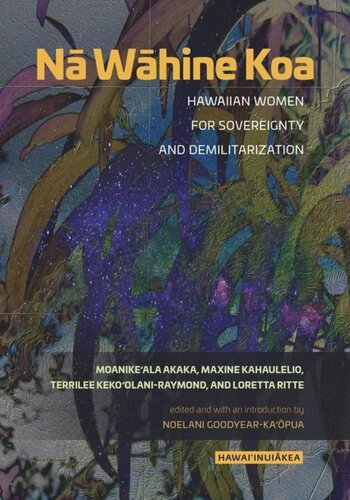

Most ebook files are in PDF format, so you can easily read them using various software such as Foxit Reader or directly on the Google Chrome browser.
Some ebook files are released by publishers in other formats such as .awz, .mobi, .epub, .fb2, etc. You may need to install specific software to read these formats on mobile/PC, such as Calibre.
Please read the tutorial at this link: https://ebookbell.com/faq
We offer FREE conversion to the popular formats you request; however, this may take some time. Therefore, right after payment, please email us, and we will try to provide the service as quickly as possible.
For some exceptional file formats or broken links (if any), please refrain from opening any disputes. Instead, email us first, and we will try to assist within a maximum of 6 hours.
EbookBell Team

4.0
96 reviewsNā Wāhine Koa: Hawaiian Women for Sovereignty and Demilitarization documents the political lives of four wāhine koa (courageous women): Moanike‘ala Akaka, Maxine Kahaulelio, Terrilee Keko‘olani-Raymond, and Loretta Ritte, who are leaders in Hawaiian movements of aloha ‘āina. They narrate the ways they came into activism and talk about what enabled them to sustain their involvement for more than four decades. All four of these warriors emerged as movement organizers in the 1970s, and each touched the Kaho‘olawe struggle during this period. While their lives and political work took different paths in the ensuing decades—whether holding public office, organizing Hawaiian homesteaders, or building international demilitarization alliances—they all maintained strong commitments to Hawaiian and related broader causes for peace, justice, and environmental health into their golden years. They remain koa aloha ‘āina—brave fighters driven by their love for their land and country.
The book opens with an introduction written by Noelani Goodyear-Ka‘ōpua, who is herself a wāhine koa, following the path of her predecessors. Her insights into the role of Hawaiian women in the sovereignty movement, paired with her tireless curiosity, footwork, and determination to listen to and internalize their stories, helped produce a book for anyone who wants to learn from the experiences of these fierce Hawaiian women. Combining life writing, photos, news articles, political testimonies, and other movement artifacts, Nā Wāhine Koa offers a vivid picture of women in the late twentieth- and early twenty-first-century Hawaiian struggles. Their stories illustrate diverse roles ‘Ōiwi women played in Hawaiian land struggles, sovereignty initiatives, and international peace and denuclearization movements. The centrality of women in these movements, along with their life stories, provide a portal toward liberated futures.